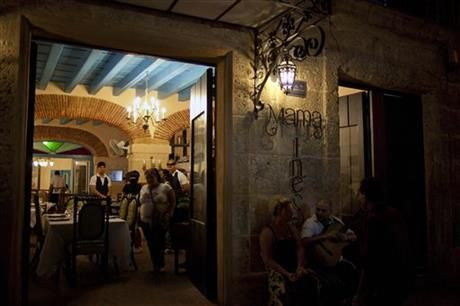
Cuba's governing Communist Party, led by Fidel Castro, nationalized even the smallest of eateries on the island nation in 1968. Now, as part of a wave of liberalizing reforms there, the government is rolling that back, turning state-run restaurants over to cooperatives of employees who will decide everything that the business does, from how to best serve its customers to how to divvy up the profits. In recent years, Cuba has been permitted small eateries and food stands to open, but this marks the first move by the government to relinquish control over preexisting restaurants' management decisions. More than 20 restaurants will be turned over in this fashion.
About 2,000 private restaurants which lease public space from the government have opened in Cuba since the government drew back restrictions on private enterprise in 2011. Some 311 economic reforms were approved that year during a congress held by the Communist Party, ramping up a process of liberalization that was already under way and putting formerly state-run services in construction, transportation, farmers' markets and light manufacturing under the control of cooperatives. "The growth of the non-public sector of the economy ... will allow the state to focus on raising the efficiency of the basic means of production ... while relieving itself from those management activities that are not strategic for the country," said head of state Raúl Castro then.
Richard Feinberg, fellow at the Washington-based Brookings Institution and expert on Cuba's economic reforms, told Reuters, "The government is hoping that cooperative owners, with pride in their establishments and motivated by profits, will offer much better service and higher quality goods to customers, both to tourists and fellow Cubans." Some of these new cooperative restaurants will serve mostly Cuban clientele, using the local peso, while others will cater more to tourists, operating on the convertible peso or CUC.
One employee and soon-to-be cooperative member, Marylin Herrera, a waitress at La Casona de 17 -- a popular tourist hangout- told Reuters she thought it would be a challenge for the over 50 workers at the restaurant to run the place, but added that she looked forward to having "much more flexibility in how we operate and what we offer". A Cuban economist who requested anonymity when talking to the news source sounded an even more skeptical note, saying the cooperates "face a difficult business environment where a decrepit infrastructure, obsolete equipment and banking practices, high taxes and restrictions on trade will make success difficult."
RELATED: Did Cuba Deny Entry To Edward Snowden? Russian Report Says US Pressure On Cuba Kept NSA Leaker In Moscow
© 2025 Latin Times. All rights reserved. Do not reproduce without permission.




